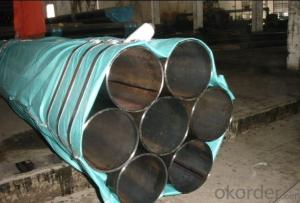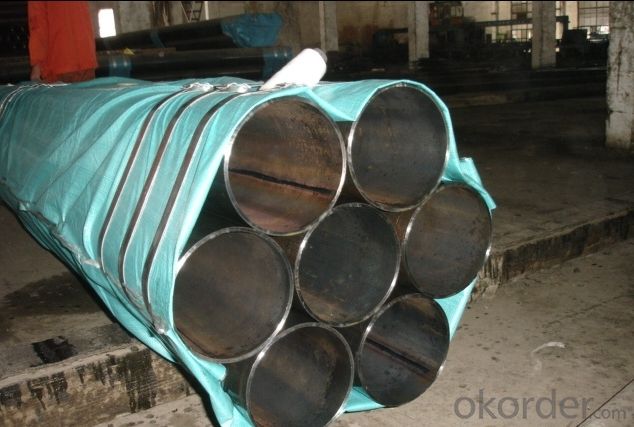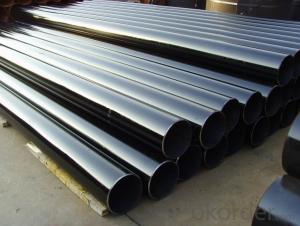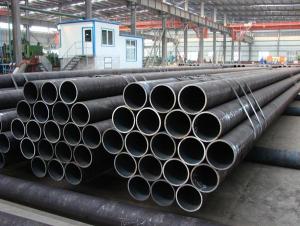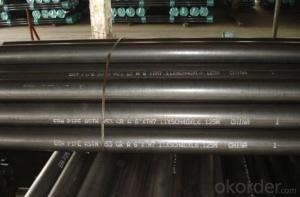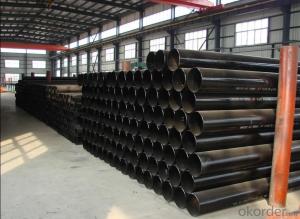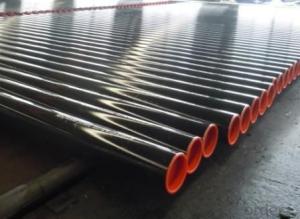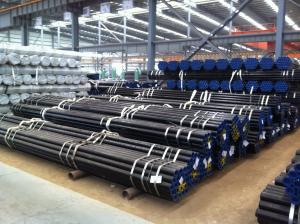ERW Steel Pipe API 5L hot sell you can find
- Loading Port:
- Tianjin
- Payment Terms:
- TT or LC
- Min Order Qty:
- 25 m.t.
- Supply Capability:
- 6000 m.t./month
OKorder Service Pledge
OKorder Financial Service
You Might Also Like
1、Structure of ERW Steel Pipe API 5L:
ERW Steel Pipe API 5L is formed by drawing a solid billet over a piercing rod to create the hollow shell. As the manufacturing process does not include any welding, and perceived to be stronger and more reliable.
2、Main Features of ERW Steel Pipe API 5L:
• Small inertia resistance
• Strong heat dissipation ability
• Good visual effect
• High manufacturing accuracy
• Power strength
3、ERW Steel Pipe API 5L Specification:
Standard | GB, DIN, ASTM ASTM A106-2006, ASTM A53-2007 |
Grade | 10#-45#, 16Mn 10#, 20#, 45#, 16Mn |
Thickness | 8 - 33 mm |
Section Shape | Round |
Outer Diameter | 133 - 219 mm |
Place of Origin | Shandong, China (Mainland) |
Secondary Or Not | Non-secondary |
Application | Hydraulic Pipe |
Technique | Cold Drawn |
Certification | API |
Surface Treatment | factory state or painted black |
Special Pipe | API Pipe |
Alloy Or Not | Non-alloy |
Length | 5-12M |
Outer Diameter | 21.3-610mm |
Grade | Q345, API , A53B |
Standard | ASME, ASTM |
1) Material:20#(ASTM A 106/A53 GRB.API5LGRB,GB),45#,16Mn,10#.
2) Specification range:OD:21.3-610mm,WT:6-70mm,length:6-12m or according to the requirement of clients.
3) Excutive standards:GB,ASME API5L.ASTM A 106/A53,Despite of the above standards,we can also supply seamless steel pipe with standard of DIN,JIS,and so on,and also develop new products according to the requirements of our clients!
4) Surface:black lacquered,varnish coating or galvanized.
4、Packaging & Delivery
Packaging Details: | seaworthy package,bundles wrapped with strong steel strip |
Delivery Detail: | 15-30days after received 30%TT |
5、FAQ of ERW Steel Pipe API 5L:
①How is the quality of your products?
Our products are manufactured strictly according to national and internaional standard, and we take a test
on every pipe before delivered out. If you want see our quality certifications and all kinds of testing report, please just ask us for it.
Guaranteed: If products’ quality don’t accord to discription as we give or the promise before you place order, we promise 100% refund.
②How about price?
Yes, we are factory and be able to give you lowest price below market one, and we have a policy that “ for saving time and absolutely honest business attitude, we quote as lowest as possible for any customer, and discount can be given according to quantity”,if you like bargain and factory price is not low enough as you think, just don’t waste your time.Please trust the quotation we would give you, it is professional one.
③Why should you chose us?
Chose happens because of quality, We can give you both.Additionally,we have professional sales team and professional cooperators and partners, and we can also offer professional products inquiry, products knowledge train(for agents), smooth goods delivery, exellent customer solution proposals.Our service formula: good quality+good price+good service=customer’s trust
SGS test is available, customer inspection before shipping is welcome, third party inspection is no problem.
6、ERW Steel Pipe API 5L Image:
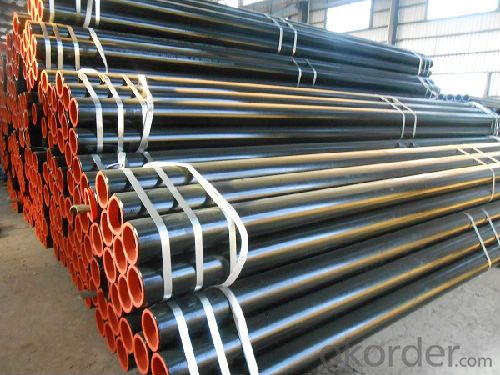
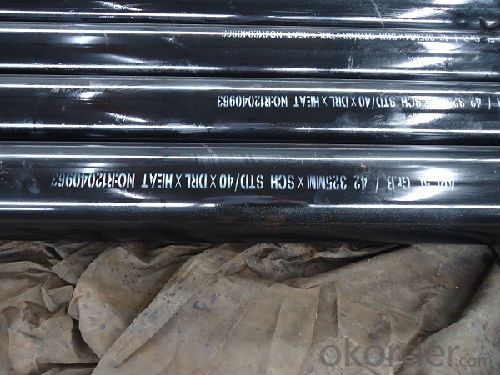
- Q: Can steel pipes be used for architectural purposes?
- Yes, steel pipes can be used for architectural purposes. They are widely used in the construction industry for structural applications such as building frames, handrails, fences, and decorative elements. Steel pipes offer strength, durability, and versatility, making them suitable for various architectural designs and applications.
- Q: What are the different testing methods for steel pipes?
- There are several testing methods for steel pipes, including visual inspection, ultrasonic testing, magnetic particle testing, dye penetrant testing, radiographic testing, and hydrostatic testing.
- Q: How do you calculate the pipe deflection for steel pipes?
- To determine the pipe deflection of steel pipes, various factors must be taken into account. Pipe deflection refers to the bending or displacement that occurs when a load is applied. The following steps outline the process for calculating pipe deflection: 1. Obtain the steel pipe properties: Familiarize yourself with the material properties of the steel pipe, including its Young's modulus (E) and moment of inertia (I). Young's modulus denotes the material's stiffness, while the moment of inertia measures its resistance to bending. 2. Identify the applied load: Determine the nature and magnitude of the load that will be exerted on the pipe. This may encompass internal pressure, external loads, or thermal expansion. 3. Utilize the appropriate formula: Depending on the load type and pipe support conditions, the suitable formula must be employed to calculate the deflection. For instance, if the pipe is simply supported (fixed at both ends), the formula δ = (5 * w * L^4) / (384 * E * I) can be used. Here, δ represents the deflection, w signifies the load per unit length, L denotes the pipe length, and E and I refer to the previously mentioned material properties. 4. Input values and compute: Insert the load, pipe length, and material properties into the formula. By doing so, the deflection of the steel pipe can be determined. It is crucial to note that calculating pipe deflection is a complex procedure that necessitates expertise in structural engineering. Therefore, it is advisable to consult a professional engineer or employ specialized software for accurate and reliable results.
- Q: How are steel pipes threaded?
- Threading, a process that involves creating screw-like grooves on the outer surface of steel pipes, enables their connection to other pipes or fittings using threaded connections. Steel pipes can be threaded through various methods, including manual threading, electric threading machines, and hydraulic threading machines. Manual threading employs a handheld pipe threading tool called a die. The die is positioned on the outside of the pipe, and while pressure is applied, the pipe is rotated to generate the threads. This technique is suitable for smaller diameter pipes and is commonly used for on-site repairs or in smaller operations. For larger diameter pipes, electric threading machines are commonly used. These machines consist of a motor-driven spindle that rotates the pipe and a die head that houses the threading dies. The operator simply feeds the pipe into the machine, and the threading dies automatically cut the threads onto the pipe. Hydraulic threading machines, similar to electric threading machines, utilize hydraulic power to rotate the pipe and create the threads. These machines are typically employed for larger diameter pipes or heavy-duty applications. Irrespective of the method employed, it is crucial to properly prepare the pipe before threading. This may involve cleaning the pipe, eliminating any burrs or sharp edges, and applying a lubricant to minimize friction during the threading process. In conclusion, threading is a widely used and efficient technique for establishing threaded connections on steel pipes. It facilitates easy assembly and disassembly of pipes and fittings, making it a popular choice in industries such as plumbing, construction, and oil and gas.
- Q: What is the difference between hot-rolled and cold-rolled steel pipes?
- Hot-rolled steel pipes are manufactured by heating the steel billets or coils to a high temperature, which allows for easier shaping and forming. The hot-rolled process also results in a rougher surface finish and larger tolerances. In contrast, cold-rolled steel pipes are made by rolling the steel at a lower temperature, resulting in a smoother surface finish, tighter tolerances, and improved strength and durability.
- Q: Is hot dipped plastic pipe steel?
- The hot dipped plastic steel pipe is a steel pipe, and it is made of special antiseptic treated composite steel pipe.
- Q: What are the different types of pipe connections used with steel pipes?
- Steel pipes are commonly connected using various types of pipe connections. The most frequently used connections are as follows: 1. Threaded connections: These connections involve screwing the ends of the pipe and using fittings with threads to connect them. They are typically used for smaller pipes and are easy to install and remove. 2. Welded connections: Welding is a popular method for joining steel pipes. This involves melting the metal and fusing the ends of the pipes together. Welded connections are strong and durable, making them suitable for high-pressure applications. 3. Flanged connections: Flanges are used to connect pipes by bolting them together. These connections are commonly used in industrial settings and are preferred for larger pipes or when easy disassembly is required for maintenance. 4. Grooved connections: Grooved fittings with internal grooves are used to connect pipes. These connections are commonly found in fire protection systems and are quick and straightforward to install. 5. Compression connections: Compression fittings are used to connect steel pipes by compressing a ferrule onto the pipe. This type of connection is frequently used in plumbing and provides a secure and tight seal. 6. Mechanical connections: Mechanical connections, such as couplings or clamps, allow for pipe connection without welding or threading. These connections are often used for temporary or emergency repairs. Each type of pipe connection has its own advantages and disadvantages. The choice of connection method depends on factors such as the application, pipe size, and installation requirements. It is crucial to carefully consider these factors to ensure a reliable and secure connection for steel pipes.
- Q: How are steel pipes used in the construction of railways and transportation systems?
- Various purposes necessitate the common use of steel pipes in the construction of railways and transportation systems. Bridges and tunnels, in particular, heavily rely on steel pipes. In bridge construction, steel pipes act as structural components, providing overall support and stability. As for tunnels, steel pipes serve as ventilation shafts, promoting air circulation and the removal of fumes, thus ensuring the safety of passengers and workers. Furthermore, steel pipes find utility in the construction of railway tracks. They are utilized as supports, offering a stable foundation for train travel. In this context, steel pipes are typically coated or galvanized to prevent corrosion and guarantee their longevity. Additionally, steel pipes are employed in drainage systems within railway stations and transport hubs, playing a crucial role in proper water management and the prevention of flooding. Another significant application of steel pipes in transportation systems lies in the construction of signposts and streetlights. In these structures, steel pipes often serve as the primary structural element, providing strength and durability. Their malleability and ease of fabrication make them a sought-after choice, as they can be shaped to meet specific design requirements. In summary, steel pipes assume a vital role in the construction of railways and transportation systems, offering structural support, ensuring adequate ventilation, facilitating drainage, and serving as key components in various structures. Their strength, durability, and versatility render them an ideal choice for these applications, contributing to the safe and efficient operation of transportation networks.
- Q: How do steel pipes perform in marine environments?
- Steel pipes perform well in marine environments due to their high strength, corrosion resistance, and durability. They are able to withstand the harsh conditions of saltwater, waves, and extreme temperatures, making them an ideal choice for various marine applications such as offshore oil and gas drilling, shipbuilding, and coastal infrastructure. Additionally, steel pipes can be coated or galvanized to further enhance their resistance to corrosion, ensuring their long-term performance and reliability in marine environments.
- Q: How can seamless steel tubes be produced?
- After extrusion to remove pipe sizing. The sizing machine passes through the cone bit and rotates into the steel embryo at high speed to form a steel tube. The inner diameter of the steel pipe is determined by the outside diameter and length of the sizing machine. When the steel tube is fixed, it enters the cooling tower and is cooled by spraying water. The steel tube is straightened after cooling. After straightening, the steel pipe is sent to the metal flaw detector (or water pressure experiment) by the conveyor belt for internal inspection. If there are cracks in the steel pipe, bubbles and other problems will be detected. Steel pipe quality inspection, but also through strict manual selection. After the quality inspection of the steel pipe, spray with the paint on the number, specifications, production batch number and so on. The crane is hoisted into the warehouse.
Send your message to us
ERW Steel Pipe API 5L hot sell you can find
- Loading Port:
- Tianjin
- Payment Terms:
- TT or LC
- Min Order Qty:
- 25 m.t.
- Supply Capability:
- 6000 m.t./month
OKorder Service Pledge
OKorder Financial Service
Similar products
Hot products
Hot Searches
Related keywords
